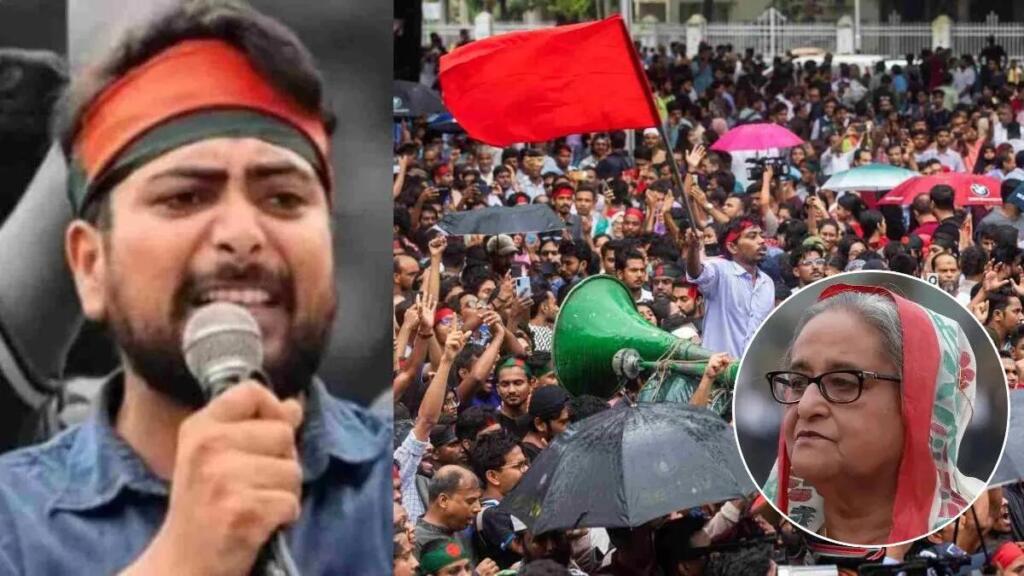Bangladesh has experienced a seismic shift in its political landscape following weeks of intense protests. These demonstrations, primarily led by students, reached a crescendo that ultimately forced Prime Minister Sheikh Hasina to resign and flee the country. In response to this unprecedented turn of events, a new interim government has taken charge, with Nobel laureate and renowned economist Muhammad Yunus assuming a leadership role.
The Face of the Bangladesh Protests
At the heart of these Bangladesh protests stands Nahid Islam, a 26-year-old sociology student from Dhaka University. Islam emerged as a pivotal figure in the movement, capturing national attention with his vocal criticism of the previous government and his role as a National Coordinator for the ‘Students Against Discrimination’ Movement.
Often seen in public with a Bangladeshi flag tied across his forehead, Islam quickly became a symbol of the youth-led resistance. His involvement in the Bangladesh protests, however, came at a personal cost. Islam faced multiple arrests and alleged mistreatment by authorities, incidents that only served to intensify public outrage and fuel the growing protest movement.
Background of Nahid Islam
Born in Dhaka in 1998, Islam comes from a middle-class background. His father works as a teacher, while his mother is a homemaker. Islam is married and has a younger brother, Nakib, who is also a student. Despite his young age, Islam has already established himself as a human rights defender, consistently advocating for social justice and democratic reforms.
Origins of the Bangladesh Protests
The Bangladesh protests initially ignited in July, focusing on a controversial job quota system.Many students viewed this system, which reserved up to 30% of government positions for family members of independence war veterans, as discriminatory. They argued that it unfairly benefited supporters of the ruling Awami League party, which had led the independence movement in 1971.
As the Bangladesh protests gained momentum, they began to expose deeper, systemic issues within the country. The demonstrations highlighted the extent of economic distress in Bangladesh, where exports have been declining and foreign exchange reserves are running low. Moreover, the protests underscored the lack of quality employment opportunities for young graduates, who increasingly seek stable government jobs in a challenging economic climate.
Escalation and Impact of the Bangladesh Protests
The situation took a dramatic turn on July 15 when the Bangladesh protests erupted into violence. Student protesters clashed with security officials and pro-government activists, prompting authorities to respond with severe measures. These included the use of tear gas, rubber bullets, and the imposition of curfews with shoot-on-sight orders. Schools were closed, and internet and mobile data services were suspended.
The unrest spread rapidly across the country, resulting in approximately 300 fatalities and thousands of injuries. This period of violence stands as one of the most turbulent in Bangladesh since its war of independence from Pakistan in 1971. The intensity and scale of the Bangladesh protests highlighted the deep-seated frustrations among the populace, particularly the younger generation.
Nahid Islam’s Role and Vision
Throughout the Bangladesh protests, Islam maintained a firm stance against the government. He called pro-government activists ‘terrorists’ and warned that students were ready to escalate their actions if necessary. His unwavering commitment to the cause, even in the face of personal danger, earned him widespread respect among protesters.
Islam proposed that Nobel laureate Muhammad Yunus be made the chief adviser to the new government, making a significant move. This suggestion gained traction and ultimately came to fruition. Islam’s influence in shaping the direction of the Bangladesh protests and their aftermath cannot be overstated.
With the formation of the interim government, Islam has joined a 16-member advisory council.
International Perspective
The events in Bangladesh have caught the attention of international observers. Sabrina Karim, an associate professor of government at Cornell University specializing in political violence, described the outcome of the Bangladesh protests as potentially “the first successful Gen Z-led revolution.” This perspective underscores the significant role that young people played in bringing about political change in Bangladesh.
Looking Ahead
As Bangladesh navigates this period of transition, the impact of the protests continues to reverberate through the nation’s political and social fabric. The involvement of youth leaders like Nahid Islam in the new government structure represents a dramatic shift from the previous political landscape.
ALSO READ: This is How They Returned the Favour to the Hindus in Bangladesh!
